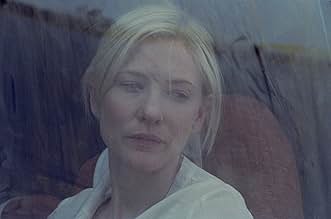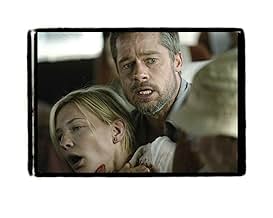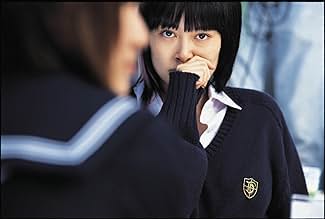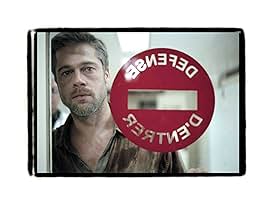Die Tragödie trifft ein Ehepaar im Urlaub in der marokkanischen Wüste und berührt eine ineinandergreifende Geschichte mit vier verschiedenen Familien.Die Tragödie trifft ein Ehepaar im Urlaub in der marokkanischen Wüste und berührt eine ineinandergreifende Geschichte mit vier verschiedenen Familien.Die Tragödie trifft ein Ehepaar im Urlaub in der marokkanischen Wüste und berührt eine ineinandergreifende Geschichte mit vier verschiedenen Familien.
- 1 Oscar gewonnen
- 45 Gewinne & 137 Nominierungen insgesamt
Empfohlene Bewertungen
"Babel" centers on several groups of people in 4 countries that are all connected by one freak accident
Alejandro González Iñárritu takes us from North Africa to North America to Asia
His film exposes four unconnected story lines that are eventually divulged to be inextricably linked to one another
The first involves an isolated family of goat herders who live in the High Plateaus of the Moroccan desert where two young boys are testing a rifle's range handed by their father to protect their goats from jackals...
The second concerns a Middle-class American couple on a bus tour of Morocco trying to save together their damaged marriage
Meanwhile, in the US, there is grave danger for an undocumented immigranta Mexican nanny as she tries to return to United States after she wrongfully decides to take her two blonde-haired young charges to her son's wedding across the Mexican border, despite her employers' sudden change of plans, that needs that she remains with them and miss the joyful occasion
And on the opposite side of the world, we follow, in Tokyo, an alienated, confused deaf and mute teenage student, recovering from her mother's suicide, who eases her feelings of depression and loneliness by trying to win the friendship or attention of every man or adolescent who crosses her path She flirts with sexual exhibitionism to attract the attention of her distant and uncommunicative father
"Babel" tries to make a point and the point is that when people can't or won't communicate, unpredictable paths can lead to tragic consequences It also tries to leave a message of how a 'shooting' from a simple 'gift' can set off a chain reaction of tragic events in three continents and four countries over which the different characters have exceedingly uncomfortable human emotion
Out of the entire cast, it is only Rinko Kikuchi as Chieko who steals the movie especially when she transmits to her friends her mad decision of sexual aggressiveness, saying to all: "Now they're going to meet the real hairy monster." This scene remembered me, in some way, Sharon Stone uncrossing legs in "Basic Instinct."
The first involves an isolated family of goat herders who live in the High Plateaus of the Moroccan desert where two young boys are testing a rifle's range handed by their father to protect their goats from jackals...
The second concerns a Middle-class American couple on a bus tour of Morocco trying to save together their damaged marriage
Meanwhile, in the US, there is grave danger for an undocumented immigranta Mexican nanny as she tries to return to United States after she wrongfully decides to take her two blonde-haired young charges to her son's wedding across the Mexican border, despite her employers' sudden change of plans, that needs that she remains with them and miss the joyful occasion
And on the opposite side of the world, we follow, in Tokyo, an alienated, confused deaf and mute teenage student, recovering from her mother's suicide, who eases her feelings of depression and loneliness by trying to win the friendship or attention of every man or adolescent who crosses her path She flirts with sexual exhibitionism to attract the attention of her distant and uncommunicative father
"Babel" tries to make a point and the point is that when people can't or won't communicate, unpredictable paths can lead to tragic consequences It also tries to leave a message of how a 'shooting' from a simple 'gift' can set off a chain reaction of tragic events in three continents and four countries over which the different characters have exceedingly uncomfortable human emotion
Out of the entire cast, it is only Rinko Kikuchi as Chieko who steals the movie especially when she transmits to her friends her mad decision of sexual aggressiveness, saying to all: "Now they're going to meet the real hairy monster." This scene remembered me, in some way, Sharon Stone uncrossing legs in "Basic Instinct."
Alejandro González Iñárritu's direction is brilliantly layered and intricately woven. He deftly uses different film stock, imagery, sound, and stories to weave a single tale out of four disparate ones, a talent he's shown in other films.
The story by screenwriter Guillermo Arriaga and Iñárritu has one incident ricochet around the globe, and peeling back the layers of culture to show the frustrating inability to communicate, and the poignancy and universality of familial love.
Each story is complete, but a series of snapshots that leave as many questions as answers. As the stories unfold, the backstories and the futures of the characters are chock full of possibility and pain. As one commenter during the Q&A said, it was frustratingly beautiful. Each storyline deals with family and conflict from the inability to communicate or to understand.
All the performances are incredible, and very touching. Brad Pitt did an excellent job, and the always outstanding Cate Blanchett, a powerhouse actor if there ever was one, has the least screen time of any of the leads. Few can do so much with so little. But the really outstanding performance is Rinko Kikuchi as a deaf-mute Tokyo teen.
To say any more would possibly lesson the experience, so let me just say this: it may seem confusing at times, but by the end, it will seem like poetry.
The story by screenwriter Guillermo Arriaga and Iñárritu has one incident ricochet around the globe, and peeling back the layers of culture to show the frustrating inability to communicate, and the poignancy and universality of familial love.
Each story is complete, but a series of snapshots that leave as many questions as answers. As the stories unfold, the backstories and the futures of the characters are chock full of possibility and pain. As one commenter during the Q&A said, it was frustratingly beautiful. Each storyline deals with family and conflict from the inability to communicate or to understand.
All the performances are incredible, and very touching. Brad Pitt did an excellent job, and the always outstanding Cate Blanchett, a powerhouse actor if there ever was one, has the least screen time of any of the leads. Few can do so much with so little. But the really outstanding performance is Rinko Kikuchi as a deaf-mute Tokyo teen.
To say any more would possibly lesson the experience, so let me just say this: it may seem confusing at times, but by the end, it will seem like poetry.
Alejandro González Iñárritu's two previous films, Amores Perros and 21 Grams, dealt with the subject of very different people being connected on a small scale. Babel takes a different approach, but has the same central theme. The plot follows four different stories that stretch the entire globe (Morocco, Japan, Mexico and a few minutes in America) and shows how one single bullet can effect the lives of people so far apart. Guillermo Arriaga's script is breathtaking and perfectly structures this vast array of characters. Within minutes of being with them, we know exactly who they are and what drives their current personality. This gives time for the epic story to play out.
It's all centered around two young boys who are fooling around with a rifle and accidentally shoot American tourist Susan (Cate Blanchett) who is on "vacation" with her husband Richard (Brad Pitt). Though never directly saying it, it's quite clear that one of their son's died and Richard panicked and left his family behind; leaving Susan to care for their two remaining children. He came back and their vacation to Morocco was really just an excuse for them to get away and try to get their marriage back together. Ultimately it does bring them back to each other, but it takes tragedy to do so. Brad Pitt's performance is one of the finest of 2006 and his internal pain and emotional strength manage to bring a river of tears flowing from my eyes. It's his best performance since Twelve Monkeys and further proves that through all of the controversy of his social life, he's still a phenomenal actor. Back in America, their nanny Amelia (Adriana Barraza) is taking care of their two children while they are gone. Through unfortunate circumstances she has to bring them to Mexico for her son's wedding and things take a huge turn for the worse when they try to cross back over into America.The final story is a much further departure from the rest of the characters. It centers around a deaf-mute Japanese schoolgirl named Chieko (Rinko Kikuchi) who struggles with the pain of being so different from everyone else along with her mother's apparent suicide and the police's attempt at questioning her father about a gun he gave to a Moroccan man (the gun used to shoot Susan).
While most people believe that the film is about how people living so close to each other can be so different, I actually feel that it's the exact opposite. I think it's a story of how people so far apart (on different continents, speaking different languages) are almost exactly alike. All of the stories center around similar themes; loneliness, alienation, depression, the loss of a loved one and more while Arriaga never forgets to subtly mention the political outrage that comes from an American woman being shot in a foreign country. Every character feels the same emotions, deals with similar pain and are all connected by this single shooting. Babel starts off as a film about very different people in very different worlds, but ends up being one studying human nature and showing that even when we're worlds apart people we can still be so similar. All you have to do is listen.
It's all centered around two young boys who are fooling around with a rifle and accidentally shoot American tourist Susan (Cate Blanchett) who is on "vacation" with her husband Richard (Brad Pitt). Though never directly saying it, it's quite clear that one of their son's died and Richard panicked and left his family behind; leaving Susan to care for their two remaining children. He came back and their vacation to Morocco was really just an excuse for them to get away and try to get their marriage back together. Ultimately it does bring them back to each other, but it takes tragedy to do so. Brad Pitt's performance is one of the finest of 2006 and his internal pain and emotional strength manage to bring a river of tears flowing from my eyes. It's his best performance since Twelve Monkeys and further proves that through all of the controversy of his social life, he's still a phenomenal actor. Back in America, their nanny Amelia (Adriana Barraza) is taking care of their two children while they are gone. Through unfortunate circumstances she has to bring them to Mexico for her son's wedding and things take a huge turn for the worse when they try to cross back over into America.The final story is a much further departure from the rest of the characters. It centers around a deaf-mute Japanese schoolgirl named Chieko (Rinko Kikuchi) who struggles with the pain of being so different from everyone else along with her mother's apparent suicide and the police's attempt at questioning her father about a gun he gave to a Moroccan man (the gun used to shoot Susan).
While most people believe that the film is about how people living so close to each other can be so different, I actually feel that it's the exact opposite. I think it's a story of how people so far apart (on different continents, speaking different languages) are almost exactly alike. All of the stories center around similar themes; loneliness, alienation, depression, the loss of a loved one and more while Arriaga never forgets to subtly mention the political outrage that comes from an American woman being shot in a foreign country. Every character feels the same emotions, deals with similar pain and are all connected by this single shooting. Babel starts off as a film about very different people in very different worlds, but ends up being one studying human nature and showing that even when we're worlds apart people we can still be so similar. All you have to do is listen.
The film opens in the Moroccan desert: an elderly tribesman trades a high-powered rifle to a goat herder for 500 diram & a goat. He hands the rifle to his two young sons and tells them to kill jackals with it, to protect the herd. As practice, the start shooting at rocks, a car passing on the hill below, and finally a bus. That's the only thing they manage to hit, putting a bullet through the shoulder of a tourist. In the middle of nowhere, there's no medical help, and no one wants to wait with the injured person except her husband. That's the setup of this complex, challenging film. It splits into four related stories, one in Japan, two in Morocco, and the last in California, where a housekeeper has to get to her son's wedding in Mexico, but has no one to watch the two children in her care. She decides to take them along, and of course things go sour. A good cast, great acting, fine cinematography, and expert direction make this film well worth watching. It's not for everyone, but for people who are ready to see deliberately paced low-key thriller, this is one good film. The split story line is reminiscent of "Syriana," but in no way copies it.
4 tenuously connected stories, beautifully shot, admirable soundtrack, and competent acting and directing. But, psychologically, philosophically, sociologically meaningful? Perhaps in their individual stories? But as a whole, I for one cannot connect the dots in this one.
Different people, different races, socio economic classes, cultures, countries, oh, and of course languages, hence communication. A lot of them making really stupid decisions, one in each tale, giving rise to tension and drama in each. Rich or poor, east or west, weak or strong, everyone is prone to just doing the wrong things at times.
It was a decent watch, even given the over bloated running time. If it affected you? Then you have understood the directors language I guess.
Different people, different races, socio economic classes, cultures, countries, oh, and of course languages, hence communication. A lot of them making really stupid decisions, one in each tale, giving rise to tension and drama in each. Rich or poor, east or west, weak or strong, everyone is prone to just doing the wrong things at times.
It was a decent watch, even given the over bloated running time. If it affected you? Then you have understood the directors language I guess.
Wusstest du schon
- WissenswertesThe scene where Chieko (Rinko Kikuchi) and her father are in the car together was shot without filming permission from the city due to slow Japanese bureaucratic procedures. The crew created "man-made" busy traffic, and began shooting the scene. Later the police started chasing them while still shooting the scene.
- PatzerAfter the wedding, Amelia, her nephew and the Jones children use the Tecate border crossing to reenter the USA. After fleeing, we are shown a sandy, wide desert where they wander. Actually, the Tecate border crossing is in the mountains, there is no such desert within a reasonable distance on the USA side. What is shown looks like an Arizona border crossing.
- Zitate
Mike Jones: My mom said Mexico is dangerous.
Santiago: [in Spanish] Yes, it's full of Mexicans.
- SoundtracksPara Que Regreses
El Chapo
Gabriel Ramirez
Maximo Aguirre Music Publishing, Inc.
D Disa Latin Music, S. de R.L. de C.V
Top-Auswahl
Melde dich zum Bewerten an und greife auf die Watchlist für personalisierte Empfehlungen zu.
Details
- Erscheinungsdatum
- Herkunftsländer
- Sprachen
- Auch bekannt als
- Tháp Babel
- Drehorte
- Produktionsfirmen
- Weitere beteiligte Unternehmen bei IMDbPro anzeigen
Box Office
- Budget
- 25.000.000 $ (geschätzt)
- Bruttoertrag in den USA und Kanada
- 34.302.837 $
- Eröffnungswochenende in den USA und in Kanada
- 389.351 $
- 29. Okt. 2006
- Weltweiter Bruttoertrag
- 135.330.835 $
- Laufzeit2 Stunden 23 Minuten
- Farbe
- Sound-Mix
- Seitenverhältnis
- 1.85 : 1
Zu dieser Seite beitragen
Bearbeitung vorschlagen oder fehlenden Inhalt hinzufügen


































